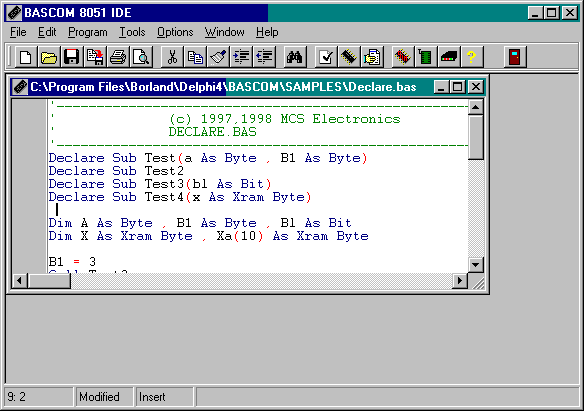GMM 932 possible
applications
- Integrated system that can be used directly on the board
developed by the user, a macro component.
- Smart intelligent nodes with local functionalities as PID
algorithms for controlling temperatures, motors, valves, etc.
- Teleacquisition and telecontrol on medium and low distances.
- Home automation: lights turning ON/OFF, heating and cooling
systems control, supervision of electric devices, security and
acces control systems.
- Car automation: lights turning ON/OFF, heating and cooling
systems control, supervision of electric devices, anti-teft and
acces control systems, functionality checks.
- Didactics: GMM 932 offers a very low cost to learn
8051 Core, we have many starter kits options. For this purpose
it is likewise interesting the GMM TST
2 support card.
- Whenever there is a short time to market: the user can see
a prototype or even a ready product in one week.
- Decentralized systems as robots, automation of production
line machines, big factory automations.
- Portable applications featured by low consumption and wide
range power supply voltage.
|
|
F E A T U
R E
- Standard container with 28 pin male socket, dual in line,
100 mils pitch, 600 mils width.
- Very small dimension: 20,7 x 38,7 x 12,8 mm.
- Weight: 6,9 g.
- 4 layers printed circuit to obtain best noisy resistance
and best EMI performance.
- Single power supply voltage required in the wide range from
3,0 to 20 Vdc, 25mA max. (the current consumption can change
according with module connections).
- Availability of power saving setting as idle mode, power
down mode and clock reduction.
- Philips P89LPC932
microcontroller (8051 code compatibile) without crystal ( internal
frequency of 7.3728 MHz ±2.5%) or with external 11,0592
MHz crystal, by ordering option .11MHz.
- High performances thanks to 2 clock machine cycle (6x).
- 8 KBytes FLASH for code, 768 Bytes RAM for data, 512 Bytes
EEPROM for data.
- 2 analog Comparators channels with different input and output
configurations options.
- 15 interrupt sources with 4 priority levels.
- 2 multifunctions Timers Counters, up to 16 bits.
- 4 CCU channels up to 16 bits with PWM, compare, capture,
etc. functionalities.
- Up to 23 digital I/O lines available on connector. Some of
these lines have multiple functions.
- Keypad interface that recognizes software presetted combinations,
on 8 of the 23 I/O lines, capable to generate interrupt.
- Hardware serial communication line with programmable physical
protocol (Baud Rate up to 115200 Baud, 8 or 9 data bits, 1 or
2 stop bit), RS 232 buffered or at TTL level.
- Serial line supports automatic address recognition and errors
detection that simplify network connection of different units.
- Transceiver MAX3222E, for RS 232 serial line, with ESD protection
up to ±15KV.
- I2C BUS controller, completely software configurable.
- SPI interface programmable for syncronous, high speed communications.
- One Real Time Clock for long and accurate timing, active
even in low power modes.
- Watch Dog section that protect the controlled system in any
operating condition.
- 1 status LED tmanaged by software through one digital I/O
line.
- One 8 ways Dip switch for operating modes selection of the
Mini Module.
- Internal FLASH can be managed through ISP
(In System Programming), or when the module is already mounted,
by using the serial communication line.
- No external programmer is needed in fact, as all the grifo® Mini
Module, the FLASH of microcontroller is Erased,
Programmed, Verified, Protected by using only the serial line
of a standard Personal Computer.
- For FLASH management on P.C. it is used the freeware
Flash Magic program available
from Esacademy.
- Wide range of software development tools used to develop
the user application program, as: Assembler (MCA51); C compilers
(µC/51, HTC51, SYS51CW, DDS Micro C51); BASIC compilers
(BASCOM 8051); PASCAL compilers (SYS51PW); contacts logic (LADDER
WORK); etc.
- Long list of demo programs and use examples supplied under
source form, duly remarked, and executable form for the available
development tools.
|














 Es. BAS.
K51
Es. BAS.
K51 Hobby
Hobby